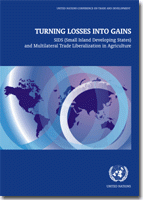
The WTO negotiations on agriculture, in particular on market access, represent one area where developing countries are clearly divided. While substantial reductions in tariffs on an MFN basis could increase the market share of agricultural exporting developing countries, that could well divert trade from other developing country suppliers whose preferential access to the market would be eroded.
This publication provides an empirical examination of the impact of “small-islandness” on the agricultural trading environment of Small Island Developing States (SIDS), and identifies the types of rules, or "modalities", that might be desirable from their trade and development perspective.
A quantitative assessment, using the ATPSM model, shows that most SIDS are likely to be worse off following multilateral liberalization because of loss of quota rents and rising prices of imports. However, one compensatory measure, that of enhanced market access specifically granted to SIDSs, could turn their welfare losses into gains. This, however, would lead to another dilemma – the new gains to SIDSs would probably be offset by losses to other developing countries. These findings encourage further attempts to seek a liberalization scenario that would achieve welfare gains for all parties involved in the negotiations.


